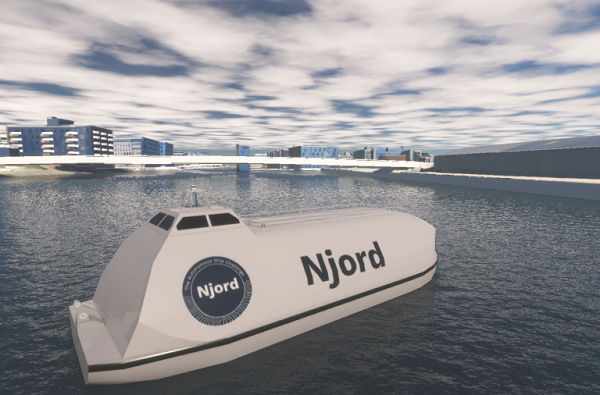
The seas of Norway were the chosen location for the adventure that led the C2SR-Atlantics team, made up of five students of Electrical and Computer Engineering and Applied Mathematics from the Faculty of Engineering of the University of Porto (FEUP), to win first place at the 2021 Njord Challenge for Autonomous Vessel Navigation, an international autonomous navigation competition that took place on August 18th and 19th, in Trondheim, Norway.
The exploration of new ideas and concepts related to the autonomous naval industry was the main objective of the competition. Challenged to create and design autonomous ship control systems, competitors faced real problems in the naval industry, contributing knowledge to the area of automation, innovation, and intelligent solutions and developing a network of contacts of future professional utility.
The winning project, which brought home a prize worth around 2,400 euros, consisted in the creation of an autonomous navigation system for a marine vehicle in a simulated environment.
“For the competition, we included a series of software modules implemented in ROS (Robot Operating System), responsible for each of the functionalities necessary for autonomous navigation, such as decision making, detection and tracking of obstacles, navigable trajectory planning, control of the vehicle and collision prevention”, advances Rômulo Rodrigues, team member and student of the Doctoral Program in Applied Mathematics at FEUP.
Matheus Reis, also part of the team, is a Ph.D. student in Electrical and Computer Engineering, and who, together with Rômulo, used his academic skills to focus on the perception and control modules. This work eventually resulted in an article to be presented at the OCEANS 2021 conference, in California (USA), at the end of September.
The remaining elements of C2SR-Atlantics, all of them members of the Cyber-Physical Control Systems and Robotics Lab (C2SR) belonging to the Center for Research in Systems and Technologies (SYSTEC) and to the Department of Electrical and Computer Engineering (DEEC) of FEUP, are Gustavo Andrade, Paulo Silva and Francisco Neves. Together, they applied “concepts previously acquired in the context of their master’s and doctoral theses” in the areas of signal processing, control systems, computer learning, artificial intelligence and robotics.
Trajectory planning for autonomous vehicles and computer learning for robotic control and computer vision were some of the most targeted areas throughout the design of the navigation system, which is now aligned with the other projects anchored in the C2SR with a component linked to marine vehicles autonomous, as is the case of IMPROVE and, more recently, of DynamiCITY and RELIABLE.
Behind a team with a solid and robust project are six months of intense work, under the guidance of António Pedro Aguiar professor at DEEC and researcher at SYSTEC, who promptly challenged the members of the laboratory to put the modules already under development to the test, giving them the opportunity to interact with new tools and work as a team on an integration project.
Translated from source: FEUP
